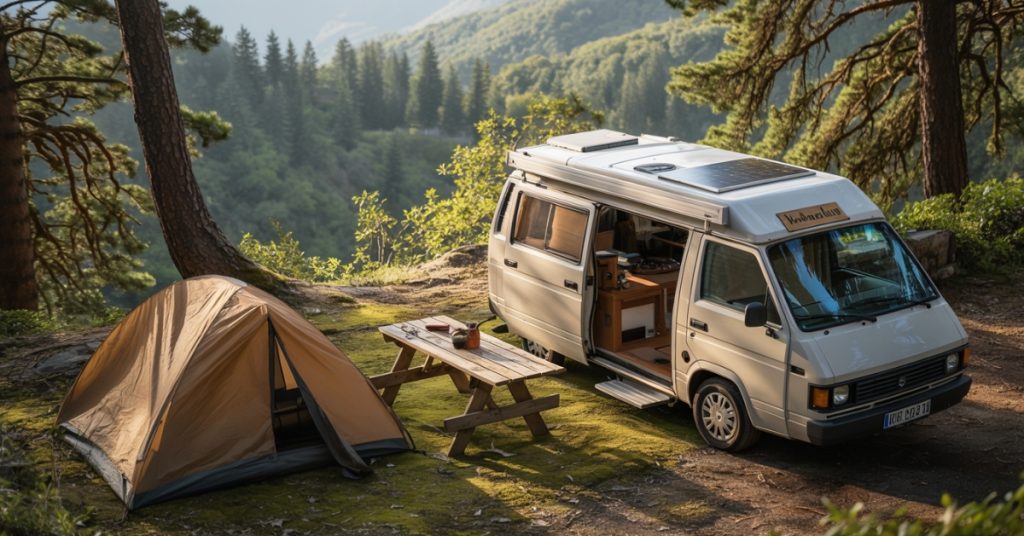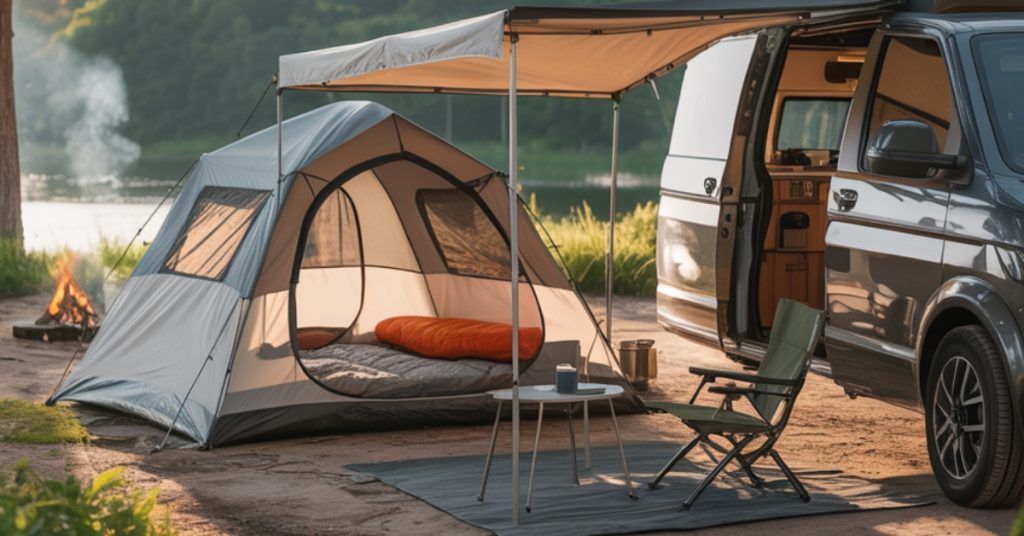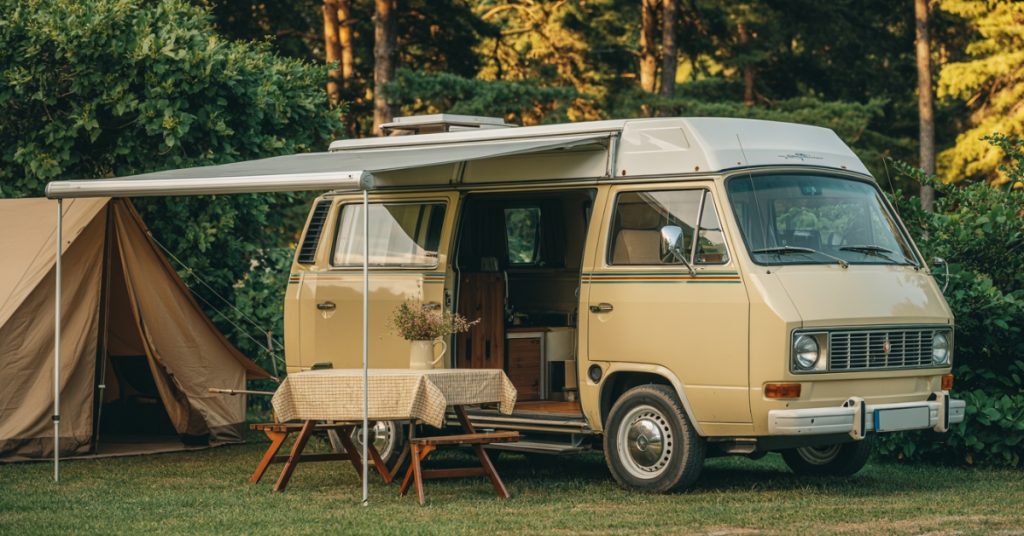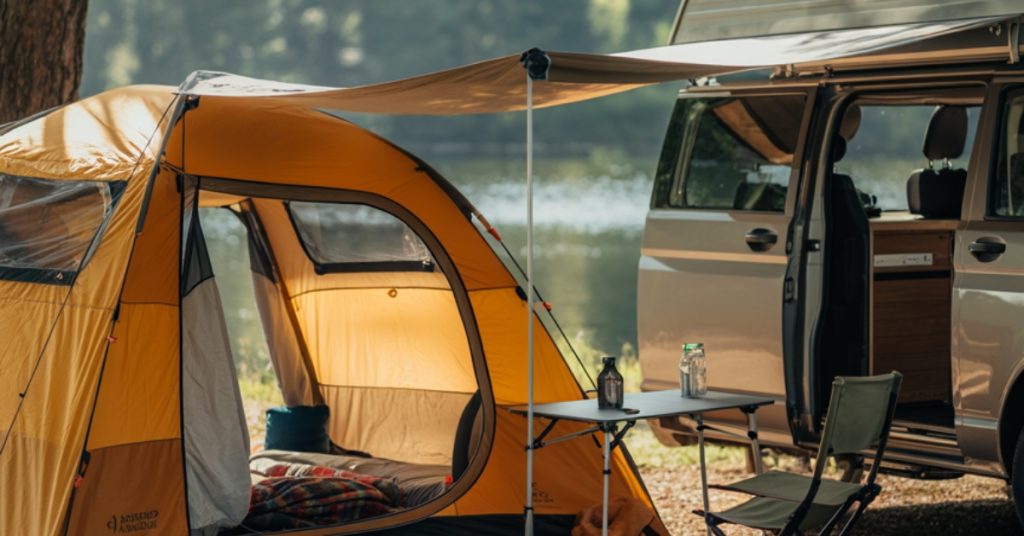As an Amazon Associate, I earn from qualifying purchases.
Many outdoor enthusiasts find themselves torn between the simplicity of tent site camping with a camper van and the convenience of traditional RV parks. If you own a camper van but prefer the intimate atmosphere of tent camping areas, you’ve probably wondered whether you can park your van at designated tent sites. The answer isn’t always straightforward and depends on several factors, including campground policies, site specifications, and local regulations.
This comprehensive guide on tent site camping with a camper van | tips & camping options will help you understand campsite rules, explore the differences between tent sites and RV sites, and provide practical advice for finding the best camping spots that welcome your van. Whether you’re planning your first camper van adventure or looking to avoid crowded RV parks, understanding these guidelines will ensure a smooth, enjoyable, and stress-free camping experience.
Contents
- 1 Understanding Tent Site vs Camper Van Site Regulations
- 2 Common Camper Van at Campsite Rules
- 3 Best Camper Vans for Tent Sites
- 4 How to Avoid RVs While Tent Camping
- 5 Tips for Successful Camper Van Tent Site Camping
- 6 Regional Variations in Campground Policies
- 7 Making Your Camper Van Tent-Site Friendly
- 8 Finding the Right Balance
Understanding Tent Site vs Camper Van Site Regulations

The difference between tent sites and camper van sites largely depends on the campground’s amenities and the type of camping equipment they accommodate. Tent sites typically offer a flat area for tents, a fire ring, and a picnic table, but lack utilities like electrical hookups, water connections, or sewer access. These sites are usually smaller with limited vehicle access.
Camper van sites, in contrast, are designed for self-contained vehicles and often include utilities like electrical hookups. They also tend to have better vehicle access and more space for parking. However, modern camper vans are often compact enough to fit in tent sites, blurring the lines between the two. Ultimately, whether you can park a camper van at a tent site depends on size restrictions and specific campground policies, such as vehicle length limits or the need for hookups.
Common Camper Van at Campsite Rules

Most campgrounds have established policies regarding vehicle use at tent sites, though these rules can vary widely. Here are the most common regulations you’ll encounter:
Vehicle Size Restrictions: Many tent sites have maximum vehicle length limits, typically ranging from 20 to 30 feet. This restriction isn’t just about the camping spot itself—it also considers road access and turning radius requirements within the campground.
Self-Containment Requirements: Some campgrounds allow camper vans at tent sites only if they’re completely self-contained. This means your van must have its own fresh water, waste water storage, and power systems without needing to connect to campground utilities.
Generator Policies: Tent camping areas often have stricter generator policies than RV sections. Many prohibit generator use entirely or restrict it to specific hours to maintain the quiet atmosphere that tent campers expect.
Occupancy Guidelines: The number of people your camper van can accommodate may need to match the tent site’s occupancy limits. A site designated for four people shouldn’t house a larger group, even if your van technically has the space.
Parking and Setup Rules: Your van typically needs to park within the designated parking area of the site. Unlike RV sites that may allow you to extend awnings or set up outdoor equipment in specific areas, tent sites may have different spatial requirements.
Best Camper Vans for Tent Sites

Not all camper vans are created equal when it comes to tent site compatibility. Compact, self-contained vehicles typically have the best success rate at tent sites, while larger Class B+ motorhomes may face more restrictions.
High-top cargo vans converted for camping often work well at tent sites. Models based on Ford Transits, Mercedes Sprinters, or Ram ProMasters in their standard wheelbase configurations usually fall within acceptable length limits while providing adequate living space.
Pop-top camper vans offer an excellent compromise between functionality and tent site compatibility. These vehicles maintain a lower profile during travel and setup, making them less obtrusive in tent camping areas. The Volkswagen California and similar models represent this category well.
Compact Class B motorhomes under 21 feet in length often qualify for tent sites. These professionally built units typically offer excellent self-containment features while remaining small enough for flexible camping options.
DIY conversions in smaller vehicles like Honda Elements, Subaru Outbacks, or compact pickup trucks with camper shells can often access tent sites without question. These minimal conversions appeal to campers who want basic shelter while maintaining the tent camping atmosphere.
The key is choosing a vehicle that doesn’t require hookups and fits within common size restrictions. Your camper van should feel at home among tents rather than dominating the campsite with its presence.
How to Avoid RVs While Tent Camping
Many camper van owners prefer the quieter, more intimate atmosphere of tent camping areas over busy RV parks. Successfully avoiding the RV crowd requires strategic planning and knowledge of different camping options.
Choose tent-only campgrounds whenever possible. These facilities specifically exclude RVs and motorhomes, ensuring a quieter environment focused on traditional camping experiences. Many state parks and some national parks maintain tent-only sections or entire campgrounds.
Book walk-in or hike-in sites that require a short walk from the parking area to your campsite. These sites naturally exclude larger RVs and create a buffer zone that enhances privacy and reduces noise from generators and air conditioning units.
Select primitive or undeveloped campgrounds that lack the hookups and amenities that attract large RVs. These basic facilities focus on the camping experience rather than convenience, attracting like-minded outdoor enthusiasts.
Research campground layouts before booking. Some mixed-use campgrounds cluster tent sites away from RV areas, creating natural separation. Look for campground maps that show site types and choose tent sites positioned away from utility hookups.
Consider shoulder season camping when large RVs are less common. Spring and fall often see fewer big rigs on the road, making tent areas more accessible and peaceful.
Explore backcountry and dispersed camping options that exclude RVs entirely due to road conditions or regulations. These primitive camping experiences offer maximum separation from RV camping culture.
Tips for Successful Camper Van Tent Site Camping
Successfully camping with your van at tent sites requires preparation, flexibility, and consideration for other campers. Here are essential strategies for a positive experience:
Call ahead to confirm policies before making reservations. Campground staff can clarify current rules and help you choose appropriate sites. Some campgrounds make exceptions for smaller, self-contained vehicles even when policies seem restrictive.
Arrive prepared for no-hookup camping. Ensure your van’s battery system, water supply, and waste storage can handle your planned stay duration. Test all systems before departure to avoid campground complications.
Respect quiet hours and generator policies strictly. Tent campers expect peaceful environments, and your compliance helps maintain positive relationships with campground management and fellow campers.
Pack additional outdoor gear to complement your van setup. Camping chairs, outdoor rugs, and portable tables help create a comfortable outdoor living space that blends well with the tent camping atmosphere.
Be flexible with your travel plans as availability at tent sites may be limited for camper vans. Having backup campground options ensures you’re not stuck without a place to stay.
Practice Leave No Trace principles rigorously. Proper waste disposal, minimal environmental impact, and respectful behavior help ensure continued access for camper vans at tent sites.
Regional Variations in Campground Policies
Campground policies regarding camper vans at tent sites vary significantly by region and management agency. Understanding these variations helps set appropriate expectations for different areas.
Western United States generally offers more flexibility due to the prevalence of van life culture and abundant public lands. Many campgrounds in states like California, Colorado, and Utah have adapted their policies to accommodate the growing number of camper van enthusiasts.
Eastern regions may have more restrictive policies, particularly in heavily forested areas where road access and site sizes limit vehicle options. However, many state parks have begun recognizing the demand for flexible camping options.
National Park Service facilities typically have the most standardized policies, though individual parks may interpret regulations differently. Some parks offer specific small RV loops that bridge the gap between tent and RV camping.
Private campgrounds usually provide the most flexibility, as they can adapt policies quickly to meet customer demand. Many private facilities have created hybrid sites designed specifically for small RVs and camper vans.
State park systems vary dramatically by state, with some offering excellent camper van accommodation while others maintain strict separation between tent and RV camping.
Making Your Camper Van Tent-Site Friendly

Certain modifications and practices can make your camper van more welcome at tent sites and help you blend in with the tent camping community.
Minimize external equipment that makes your setup appear more like RV camping. Avoid deploying large awnings, multiple slide-outs, or extensive outdoor kitchen setups that dominate the campsite.
Choose earth-tone colors for your van exterior and camping equipment. Subtle colors help your van blend into natural surroundings better than bright, commercial RV-style designs.
Install efficient power systems that eliminate the need for generators. Solar panels, efficient battery systems, and LED lighting allow you to camp quietly without disturbing tent neighbors.
Design compact storage solutions that keep your gear organized and minimize the footprint around your campsite. Tidy camping setups are more welcome in tent areas and show respect for shared spaces.
Invest in quality ventilation that reduces condensation and eliminates the need for air conditioning units that create noise and require electrical hookups.
Finding the Right Balance
Successfully using a camper van at tent sites requires understanding both the letter and spirit of campground regulations. While many facilities welcome small, respectful camper vans, the key lies in choosing appropriate vehicles, researching campground policies, and camping considerately.
The growing popularity of van life has prompted many campgrounds to reconsider their policies and create more inclusive camping options. By following established guidelines, respecting fellow campers, and maintaining flexibility in your travel plans, you can enjoy the best of both worlds—the convenience of your camper van and the authentic atmosphere of tent camping.
Remember that successful camper van tent site camping depends as much on your approach and attitude as it does on regulations and vehicle specifications. Respectful, prepared campers who understand and follow campground expectations will find many opportunities to enjoy tent sites with their converted vehicles.
Frequently Asked Questions
1. Can I park my camper van at any tent site?
Not always. Campgrounds usually have specific rules about which vehicles can use tent sites. Many require camper vans to be under a certain length (commonly 20–30 feet) and fully self-contained. Camper vans are often welcome if they meet these requirements, but it’s always best to check the campground’s website or call ahead before booking.
2. What’s the difference between tent sites and RV sites for camper vans?
Tent sites are generally smaller, without utilities like electrical hookups or water connections, and focus on providing a natural camping experience. RV sites, by contrast, are larger, equipped with utilities, and built for bigger rigs. For camper van owners, tent sites can be a quieter, more affordable option as long as the van meets the size and setup rules.
3. How do I find campgrounds that allow camper vans at tent sites?
The easiest way is to check campground websites for vehicle restrictions and site details. Apps like Campendium and FreeRoam are also excellent for van lifers to locate suitable spots. Calling campgrounds directly can help clarify rules, and private campgrounds often provide more flexibility than government-run facilities.
4. Are there size restrictions for camper vans at tent sites?
Yes. Most tent sites limit camper vans to 20–30 feet in length, while some may only allow vehicles under 16 feet. These rules usually reflect campsite size and the accessibility of campground roads. Since restrictions vary widely, always confirm the policy of the specific campground before booking.
5. Do I need special equipment to camp at tent sites with my camper van?
Because tent sites typically don’t provide hookups, your camper van should be self-contained with its own power, water, and waste system. A strong battery setup, fresh water storage, and holding tanks are essential. Avoiding noisy generators is also important to maintain a good camping atmosphere and positive relationships with tent campers.
As an Amazon Associate, I earn from qualifying purchases.
